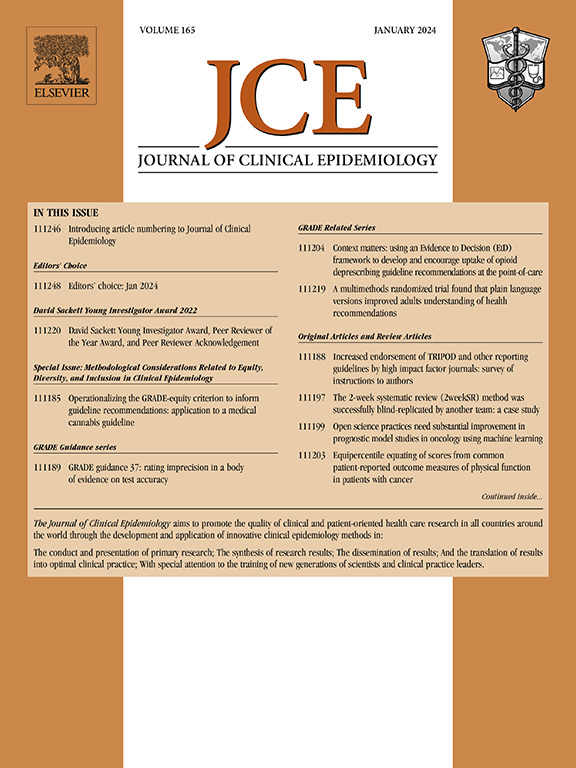Clinical study report data did not substantially alter point estimates but improved precision in a nephrology systematic review
IF 5.2
2区 医学
Q1 HEALTH CARE SCIENCES & SERVICES
引用次数: 0
Abstract
Objectives
To investigate the effect of adding clinical study report (CSR) data to publication and author data on data completeness and meta-analytical results.
Study Design and Setting
Case report of a systematic review with meta-analysis of randomized controlled trials on icodextrin compared to glucose solutions in peritoneal dialysis including 19 clinical trials. We considered the outcomes mortality, peritoneal dialysis technique failure, quality of life, net peritoneal ultrafiltration (at 3–6 months, and 1–2 years), serious adverse events (SAE), peritonitis, and uncontrolled fluid overload. The results for these outcomes were reanalyzed using (a) publication and author data only, then compared with (b) publication and author data with added CSR data. At outcome level, we compared the number of included trials, pooled point estimates (ie, regarding effect direction), and 95% confidence intervals (CIs; ie, regarding overlap and width) between the two groups of trials (a and b). We illustrated the results of our meta-analyses in forest plots and narratively summarized them.
Results
Except for two of the eight assessed outcomes (quality of life and net peritoneal ultrafiltration [1–2 years]), more complete data was available when adding CSRs to publication and author data. Point estimates were not statistically significantly different for publication and author data, compared to publication, author, and CSR data, for any outcome. For peritonitis, point estimates were on opposite sides of the line of no effect but remained statistically nonsignificant when adding CSR data. For SAE and net peritoneal ultrafiltration (3–6 months), the width of the 95% CI was narrower when adding CSR data and for net peritoneal ultrafiltration (3–6 months), in addition, the point estimate statistically significantly favored icodextrin when adding CSR data.
Conclusion
The fraction of publications reporting results varied substantially by outcome, with SAE most under-reported in publications. While the integration of CSR data did not substantially alter meta-analytical results, it enhanced data completeness and precision in effect estimates. Our findings underscore the importance of accessing CSR data to optimize evidence syntheses and inform clinical decision-making.
Plain Language Summary
When researchers want to understand how well a treatment works, they often combine results from several clinical studies in a process called a meta-analysis. Usually, these analyses rely on data published in scientific journals. However, published articles don't always include all the important results. Additional information can sometimes be found in clinical study reports (CSRs), which are detailed documents submitted by pharmaceutical companies to regulatory agencies. In this study, we looked at how including CSR data might affect the results of a meta-analysis. We focused on 19 clinical trials that compared two types of interventions used in peritoneal dialysis for patients with kidney disease: solutions based on icodextrin, a sugar polymer, or on a sugar called glucose. We analyzed several health outcomes such as survival, quality of life, peritoneal ultrafiltration, and complications like infections or kidney function, and serious side effects. First, we analyzed the results using only published articles and information provided by study authors. Then we repeated the analysis, this time adding data from CSRs where available. We compared the number of studies included, the size and direction of treatment effects, and the precision of the results. We found that adding CSRs often provided more complete information, especially for outcomes like serious side effects that were not always reported in journal articles. The overall direction of the results—whether icodextrin was better, worse, or the same—did not change much when CSR data was added. However, the results became more precise in two cases (serious side effects and peritoneal ultrafiltration). In one case, adding CSR data made the benefit of icodextrin statistically significant (peritoneal ultrafiltration). In summary, although adding CSR data did not substantially change the main conclusions, it improved the completeness and accuracy of the results. This shows that using CSRs in research summaries can provide a more reliable basis for making clinical decisions.
临床研究报告数据并没有实质性地改变肾脏病系统评价的点估计,但提高了准确性。
目的:探讨临床研究报告(CSR)数据加入出版物和作者资料对数据完整性和meta分析结果的影响。研究设计和背景:一项系统评价与meta分析的病例报告,其中包括19项临床试验,将醋酸糊精与葡萄糖溶液在腹膜透析中进行比较。我们考虑了死亡率、腹膜透析技术失败、生活质量、净腹膜超滤(3-6个月和1-2年)、严重不良事件(SAE)、腹膜炎和不受控制的液体超载。使用(a)出版物和作者数据重新分析这些结果,然后与(b)出版物和作者数据添加CSR数据进行比较。在结果水平上,我们比较了纳入试验的数量、合并点估计(即关于效果方向)和95%置信区间(ci;即,关于两组试验(a和b)之间的重叠和宽度。我们对森林样地的meta分析结果进行了说明,并进行了叙述性总结。结果:在8项评估结果中,除了2项(生活质量和净腹膜超滤[1-2年])外,将csr添加到发表和作者数据中可获得更完整的数据。对于任何结果,与发表、作者和CSR数据相比,发表和作者数据的点估计值在统计学上没有显著差异。对于腹膜炎,点估计值在无影响线的两侧,但在添加CSR数据时仍无统计学意义。对于SAE和净腹膜超滤(3-6个月),添加CSR数据时95% CI宽度更窄,对于净腹膜超滤(3-6个月),此外,添加CSR数据时,点估计在统计学上显著倾向于icodextrin。结论:报告结果的出版物的比例因结果而异,SAE在出版物中被低估的最多。虽然企业社会责任数据的整合并没有实质性地改变元分析结果,但它提高了数据的完整性和效果估计的准确性。我们的研究结果强调了获取CSR数据对优化证据合成和为临床决策提供信息的重要性。简单的语言总结:当研究人员想要了解一种治疗方法的效果如何时,他们通常会将几项临床研究的结果结合起来,这一过程被称为荟萃分析。通常,这些分析依赖于发表在科学期刊上的数据。然而,发表的文章并不总是包括所有重要的结果。有时可以在临床研究报告(CSRs)中找到其他信息,这些报告是制药公司向监管机构提交的详细文件。在本研究中,我们研究了CSR数据如何影响meta分析的结果。我们重点研究了19项临床试验,这些试验比较了两种用于肾脏疾病患者腹膜透析的干预措施:基于糖聚合物icodextrin的溶液或基于葡萄糖的溶液。我们分析了几种健康结果,如生存、生活质量、腹膜超滤、感染或肾功能等并发症以及严重的副作用。首先,我们仅使用已发表的文章和研究作者提供的信息来分析结果。然后我们重复分析,这一次添加来自csr的可用数据。我们比较了纳入研究的数量、治疗效果的大小和方向以及结果的精度。我们发现,添加csr通常提供更完整的信息,特别是对于期刊文章中不经常报道的严重副作用等结果。结果的总体方向——无论icodextrin是好是坏,还是一样——在加入CSR数据后并没有太大的变化。然而,在两例(严重副作用和腹膜超滤)中,结果变得更加精确。在一个病例中,添加CSR数据使icodextrin的益处具有统计学意义(腹膜超滤)。综上所述,虽然加入CSR数据并没有对主要结论产生实质性的改变,但提高了结果的完整性和准确性。这说明在研究总结中使用csr可以为临床决策提供更可靠的依据。
本文章由计算机程序翻译,如有差异,请以英文原文为准。
求助全文
约1分钟内获得全文
求助全文
来源期刊

Journal of Clinical Epidemiology
医学-公共卫生、环境卫生与职业卫生
CiteScore
12.00
自引率
6.90%
发文量
320
审稿时长
44 days
期刊介绍:
The Journal of Clinical Epidemiology strives to enhance the quality of clinical and patient-oriented healthcare research by advancing and applying innovative methods in conducting, presenting, synthesizing, disseminating, and translating research results into optimal clinical practice. Special emphasis is placed on training new generations of scientists and clinical practice leaders.
 求助内容:
求助内容: 应助结果提醒方式:
应助结果提醒方式:


